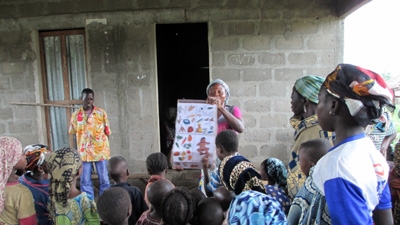COTONOU, October 4, 2013 - In Benin, the government has enlisted a powerful ally to combat malnutrition. In communities where chronic malnutrition rates are particularly high, grandmothers have been marshaled to keep a watchful eye on the health of young children and to educate the whole village about the importance of proper nutrition.
This innovative strategy is part of the Community Nutrition Education Project (Projet pédagogique de nutrition communautaire, or PNC) launched in January 2012 with World Bank assistance. Implemented by local nongovernmental organizations (NGOs) under the aegis of Plan Bénin, an international humanitarian NGO focused on children, this project is a major asset to the community. A total of 12,607 grandmothers have received training in the health and well-being of pregnant women and young children. Their mission is to convince the entire village of the need to adopt sound nutritional practices.
“The training allowed us to better understand the nutritional value of local food. For example, moringa and baobab leaves, powdered and added to baby food mash, are very nutritious,” states Marguerite Hlanon, who heads the food and nutrition oversight committee of Awamé 1 village in Athiémé, a commune (group of small villages) in the southwestern part of the country. “We also received training on the role of hygiene in nutrition. Since then,” she adds, “the number of health center visits has dropped, because our children don’t get sick as often.”

